※Progressive Stamping : Progressive stamping is a metalworking method that encompasses plural processes such as blanking, bending and drawing combined with a sheet metal feeding system in one die.
Curling Parts & Drawing Parts
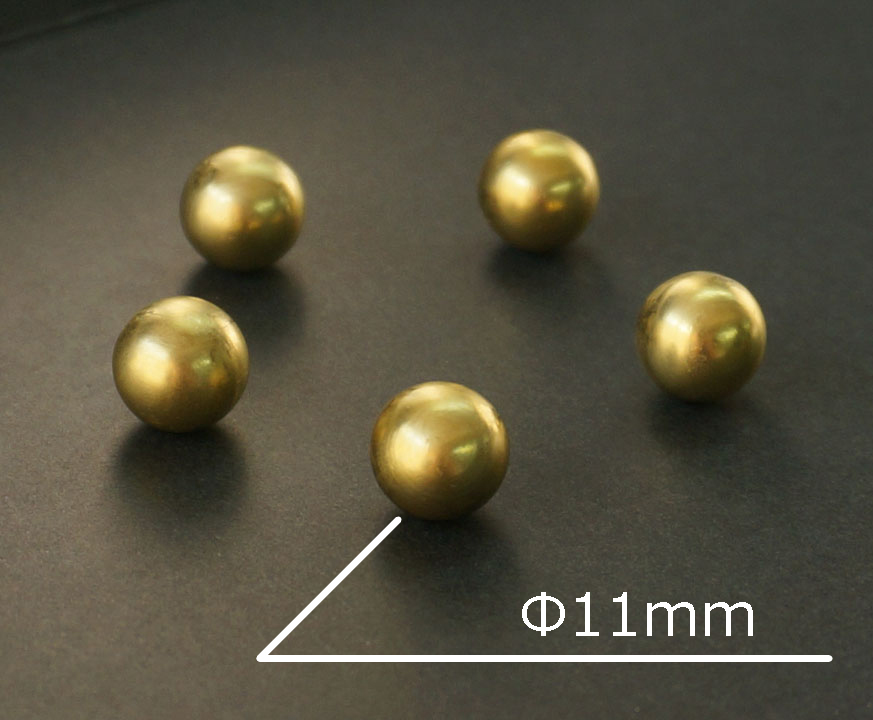
Spherical Body
Material & Thickness
Brass (0.2mm)
Typical Manufacturing Limitations
It was impossible to make a spherical object from a plate without having an opening area on the shape.
JKB's Advanced Technology
We are successful in stamping completely sealed spherical body from a flat plate.
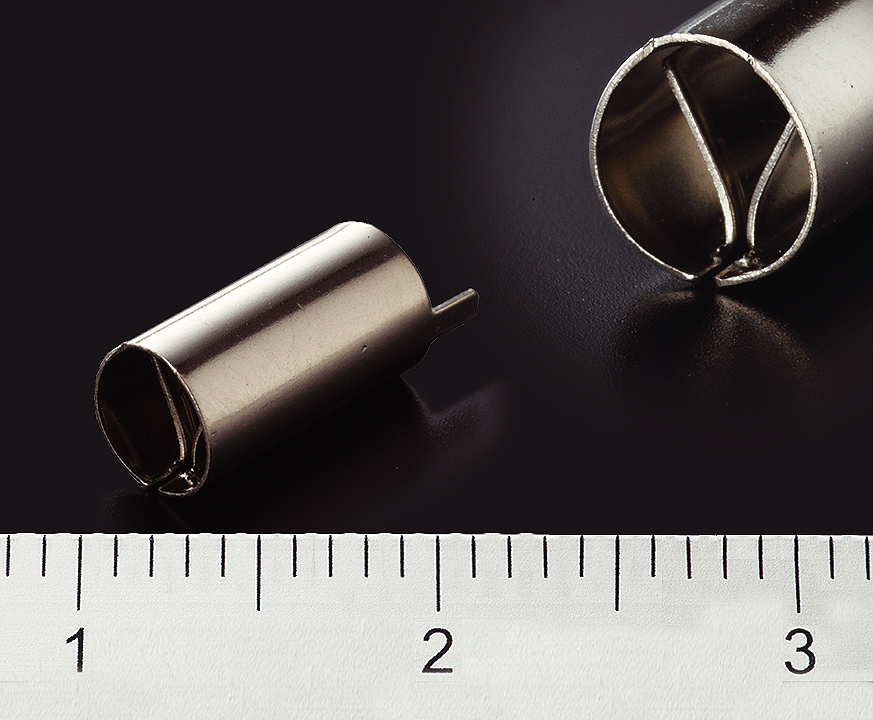
"Cylinder"+"V Shape Wing"
Material & Thickness
Nickel (0.2mm)
Typical Manufacturing Limitations
This product was previously difficult to make because the form has a V-shaped wing inside a circular shape which required a precise circularity. This product was made by combining two separate parts, one being circular in shape , the other having a Vshaped wing.
JKB's Advanced Technology
We are successful in making the entire shape in one strike using a progressive die. We also achieve a circularity of 20μm for the circular part of this product that includes a V-shaped wing.
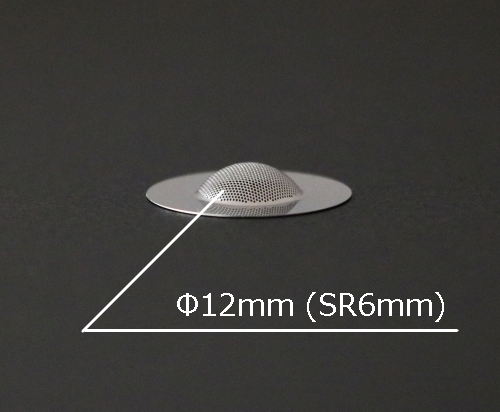
Meshed Dome
Material & Thickness
Stainless Steel (0.2mm) plate thickness & hole diameter = 0.2mm / crosspiece width = 0.1 mm.
Typical Manufacturing Limitations
Problems such as the mesh breaking and the hole shape deforming occur when the parts are stamped because of the fine mesh shape. Typically, solving these problems cannot be achieved without making changes such as increasing the plate thickness or making the mesh less fine.
JKB's Advanced Technology
JKB succeeded in stamping the above-mentioned part defect-free and not only achieved high precision but also realized the commercialization of such parts.

Metal Cap
Material & Thickness
Nickel (0.2mm)
Typical Manufacturing Limitations
The slit shape on the drawing side can become deformed, making it difficult to maintain dimensional accuracy.
JKB's Advanced Technology
JKB realized progressive stamping to succeed in drawing with high precision, ensuring the dimensional accuracy of the slit from the side to the bottom.

Metal Case
Material & Thickness
Steel (0.2mm)
Typical Manufacturing Limitations
It is usually necessary to use a 0.3mm welding projection from the edge which makes it difficult to stamp such products.
JKB's Advanced Technology
JKB achieved the production of a 0.3mm stamping die and can make such cases using progressive stamping dies.
Precise Parts
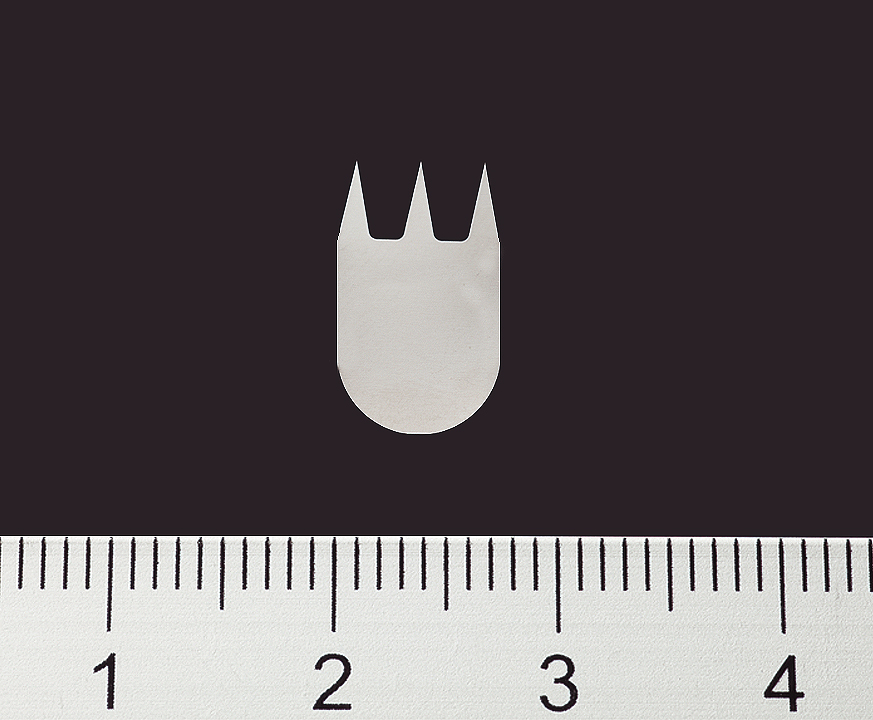
Sharp Points Medical Device Part
Material & Thickness
Stainless Steel (0.15mm)
Typical Manufacturing Limitations
This product used to be made by grinding one-by-one. So the product can be supplied at extremely expensive price. It is possible to lower the cost if it is made by lathe. But it could only make coincidently few pieces out of a thousand pieces.
JKB's Advanced Technology
JKB has developed truly groundbreaking technology of making this product by stamping and we achieved making a sharp edge of 6μm in all directions. Therefore we are able to supply this product within 1/1000 of the past price.
We contribute a lot to the medical field to enrich peopleʼs health care through supplying our new product.
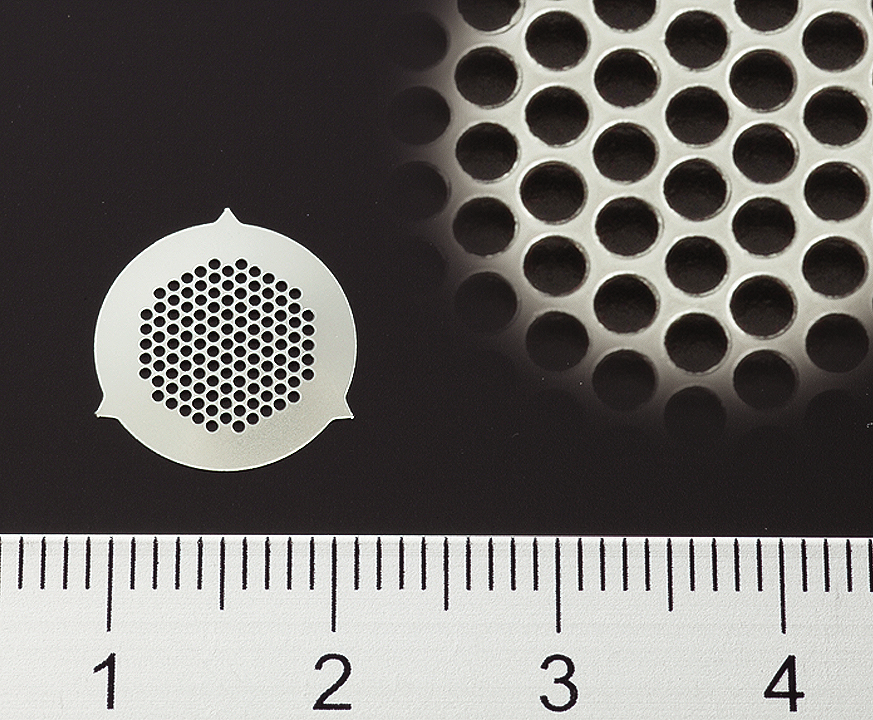
Filter
Material & Thickness
Stainless Steel (0.15mm)
Typical Manufacturing Limitations
This product was previously made using photo etching which required an ultra microscopic process. As a result , production costs were high.
JKB's Advanced Technology
We are successful in stamping more than 120 small holes within the area of 1/6th of a 10-cent coin. The tolerance of the hole pitch is less than 3μm. The price of this product is greatly reduced to 10% of the current market price.
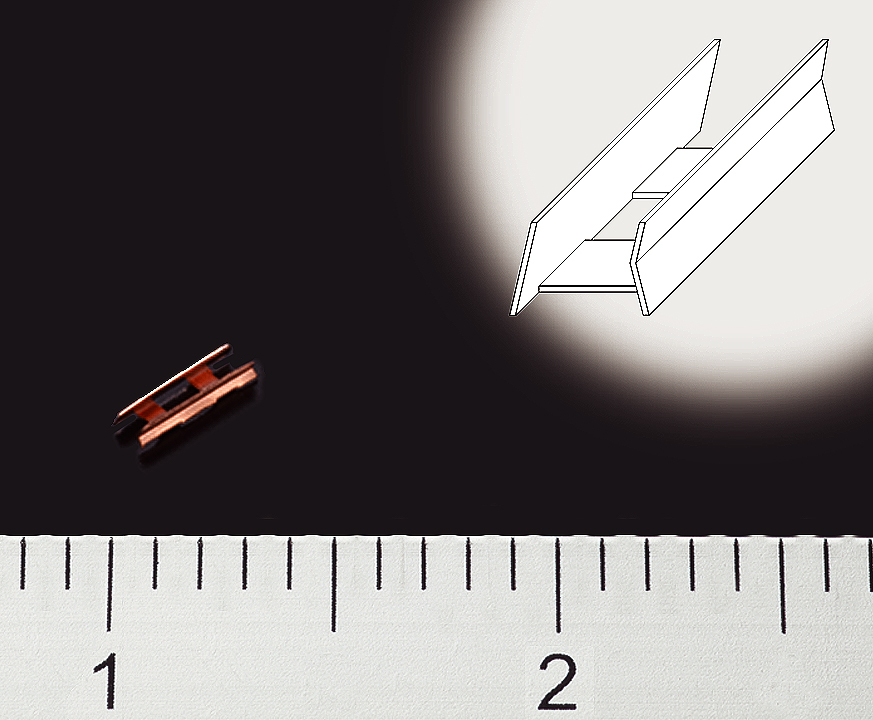
Micro Clip
Material & Thickness
Beryllium Copper Alloy (0.06mm)
Typical Manufacturing Limitations
In the past, this product was extremely difficult to make since the stamping required a very high level of precision, as the material is only 0.06mm in thickness.
JKB's Advanced Technology
We successfully make this form at an accuracy of ±10μm using a progressive die. This process is exceptional taking into consideration the extreme thinness of the material being manipulated.

Ring
Material & Thickness
Phosphor Bronze with Nickel Plating (0.7mm)
Typical Manufacturing Limitations
When rings are made by stamping, warping often occurs. To achieve ultra-flat rings, polishing treatment is required, which results in additional costs.
JKB's Advanced Technology
JKB succeeded in stamping metal rings with a flatness of 10μm. As a result, the post-processing polishing treatment was reduced, which lowered costs.
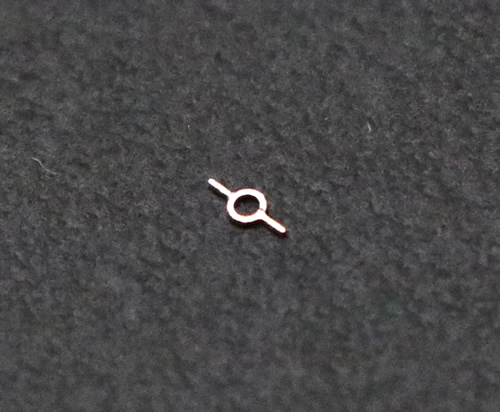
Micro Device
Material & Thickness
Stainless Steel (0.2mm)
Typical Manufacturing Limitations
Because it is a micro-fabricated product that requires a high degree of flatness with a width of 0.2mm, wire-cut processing is required, and the high price makes it impossible to use it as a disposable component.
JKB's Advanced Technology
By making the plate thinner than conventional products and successfully stamping it with a flatness of 10μm, JKB was able to minimize costs, contributing to the expansion of research and exploring the possibilities of such disposable parts.
These requirements came from Tokai University's Keishi Kimura Laboratory.
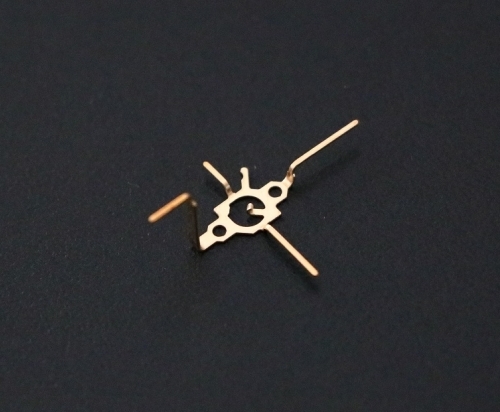
Arms
Material & Thickness
Phosphor Bronze (0.3mm)
Typical Manufacturing Limitations
Due to the complex shape with a curl-shaped arm inside the center hole, it is necessary to insert microscopic die parts into the stamping die. This makes it impossible to design or manufacture a progressive die.
JKB's Advanced Technology
JKB succeeded in designing and manufacturing a microstamping die using progressive stamping techniques. Furthermore, the parts were extremely precisely made. For example, the curled shape of the arm had a bending tolerance of ±30μm.
Special Metal Parts
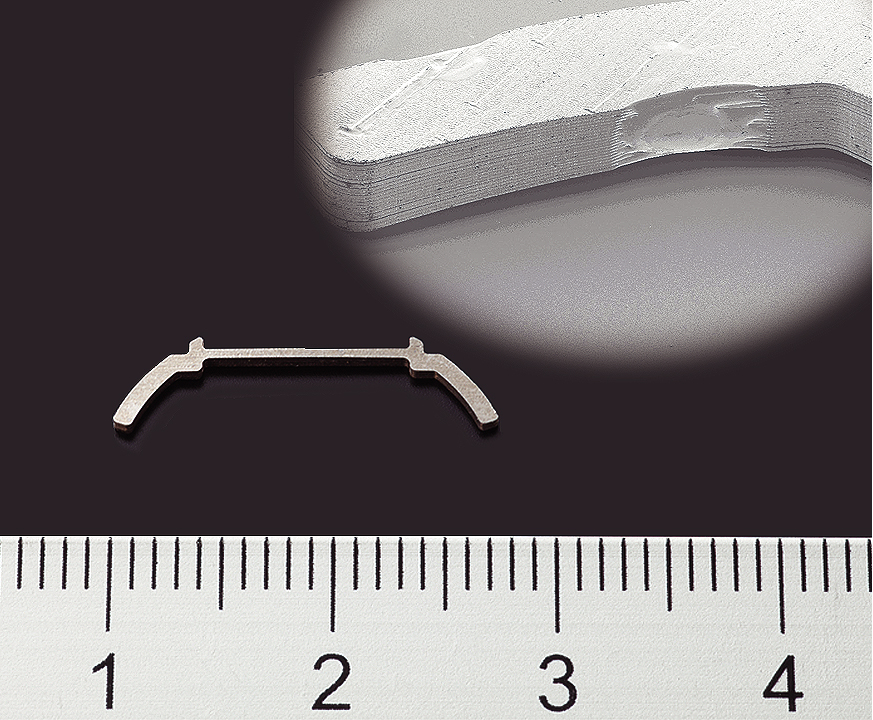
Antenna Core
Material & Thickness
Amorphous Alloy (0.023mm)
Typical Manufacturing Limitations
Continuous stamping is difficult due to the hardness of the amorphous alloy, a glass-like material. Furthermore, lamination fixation of thin stamped plates could only be achieved using adhesives with low productivity levels. Lamination fixation by caulking was not possible with such thin plates.
JKB's Advanced Technology
JKB succeeded in manufacturing an ultra-high precision stamping die and realized continuous stamping of extremely hard materials. Additionally, productivity and quality were improved by laminating and fixing the plates using laser welding. Furthermore, JKB succeeded in laminating and fixing 20 stamped plates using ultra-precise laser welding without changing the metal's properties.
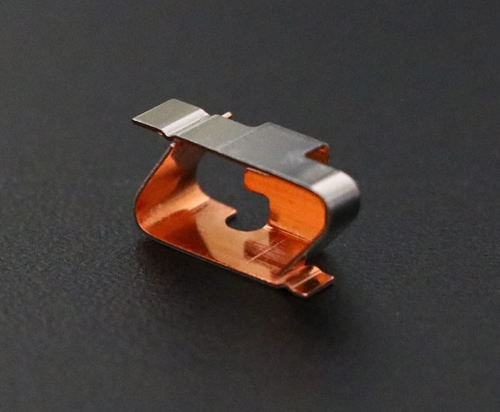
Cladding Metal Connector
Material & Thickness
Cladding Metal: Copper & Stainless Steel (0.4mm)
Typical Manufacturing Limitations
Stainless steel and copper cladding materials have different bending properties on the front and back surfaces, which causes distortion during bending, making high-precision processing and stamping difficult.
JKB's Advanced Technology
JKB excels at high-precision punching and bending of cladding material using progressive stamping dies.
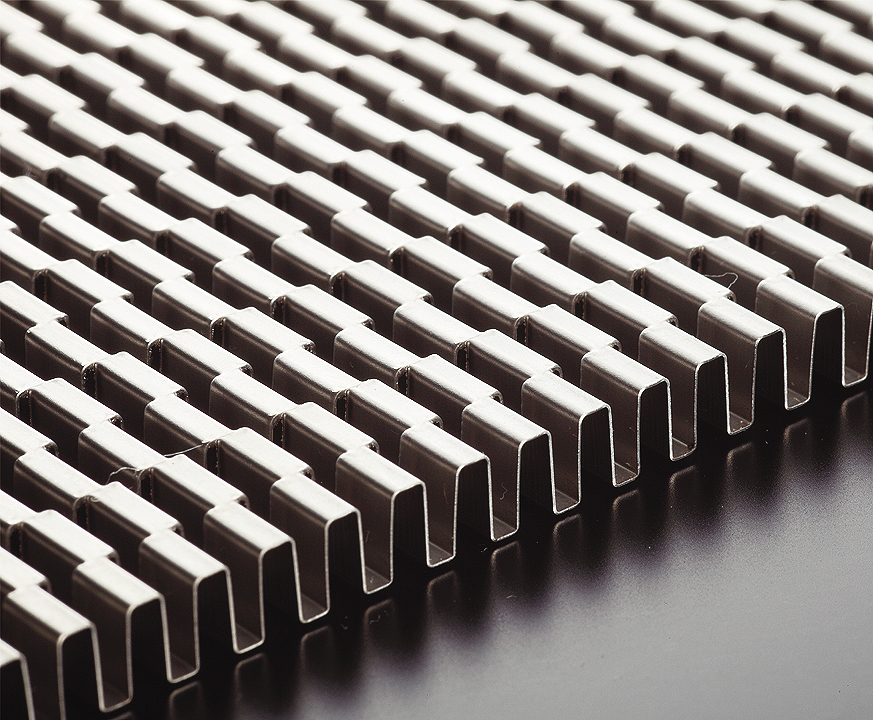
Offset Strip Fin ( Inconel ® Alloy )
Material & Thickness
Inconel ® Alloy (0.1mm)
Typical Manufacturing Limitations
This product is generally impossible to produce without the separation of the metal into small pieces. Not only is the shape complex, but the Inconel ® alloy material is hard and difficult to stamp without damaging the dies or breaking the Inconel ® alloy material.
JKB's Advanced Technology
JKB has been able to develop truly groundbreaking technology, utilizing a combination of lancing and drawing of Inconel ® alloy. We can successfully produce such products using one progressive die. We are the first company in Japan to achieve this solution.
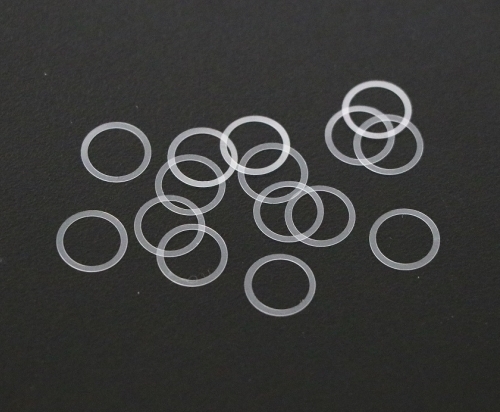
Spacer ( Polvethyleneterephthalate )
Material & Thickness
PET: Polvethyleneterephthalate (0.1mm)
Typical Manufacturing Limitations
Conventional resin punching has problems such as low productivity levels and the inability to maintain levels of high precision.
JKB's Advanced Technology
By applying our state-of-the-art metal stamping technology, JKB succeeded in making a 0.1mm thick PET material into a ring shape with high concentricity and no burrs, at a low cost.
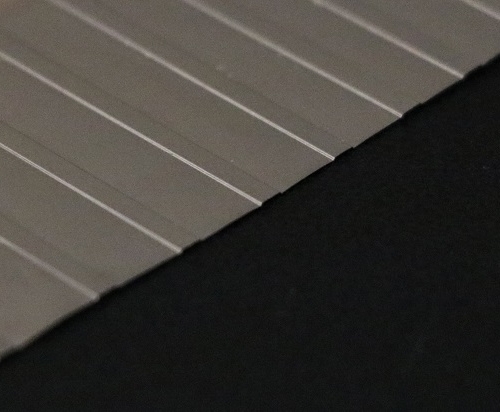
Metal Foil Part
Material & Thickness
Stainless Steel 0.005mm (5μm)
Typical Manufacturing Limitations
Stamping metal foil with a thickness of 5μm is typically considered impossible because of the difficulty of creating an ultra-high precision die to achieve burr-free stamping. Additionally, it is impossible to bend such parts with high precision because the material is very thin, and a large amount of spring-back occurs.
JKB's Advanced Technology
JKB succeeded in making an ultra-high precision die and achieved burr-less stamping and high-precision bending of a metal foil with a thickness of 5μm.
Difficult Forming Parts
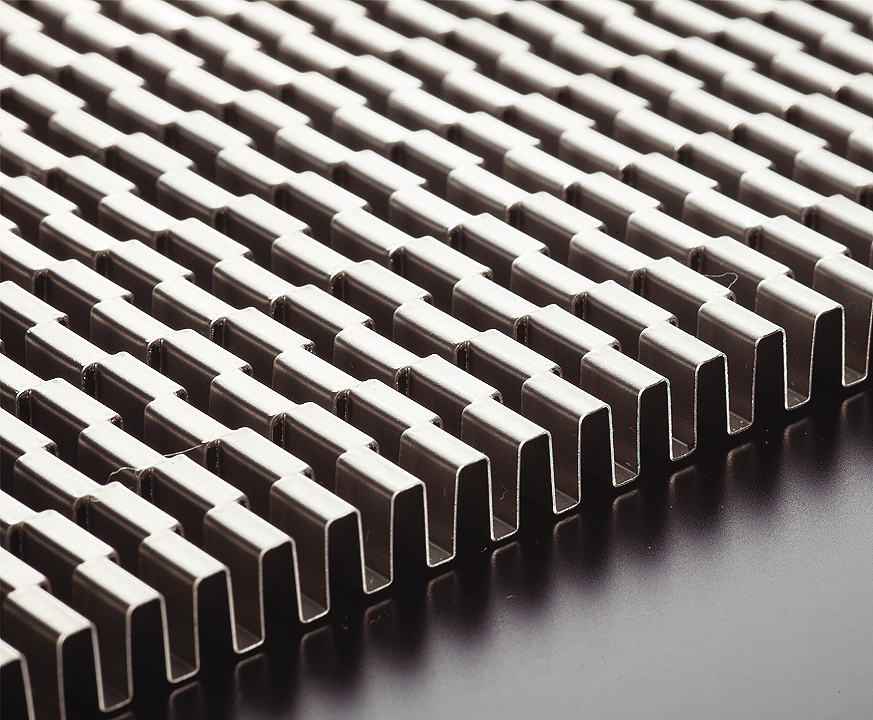
Offset Strip Fin ( Stainless Steel )
Material & Thickness
Stainless Steel (0.3mm)
Typical Manufacturing Limitations
To stamp this product using the current technology on the market is impossible without the separation of the metal into small pieces. Therefore, the processing conditions required are extremely complicated and highly complex.
JKB's Advanced Technology
JKB has been able to develop truly groundbreaking technology, utilizing a combination of lancing and drawing of stainless steel. We are successful in making this form using one progressive die. We are the first company in Japan to achieve this solution.

Banana Plug
Material & Thickness
Stainless Steel (0.2mm)
Typical Manufacturing Limitations
It was difficult to make this product by a progressive die because it was hard to design a carrying web (a connecting part required in the shape for feeding the raw material). The processing of this form required several steps using a combination of different dies. As a result, this product was supplied in small quantities and at a high price.
JKB's Advanced Technology
We are successful in stamping this product using one progressive die. This form is made by stamping out, bending and squeezing with one strike of the die. Therefore, we are able to supply this product in large quantities and at a significantly lower price.
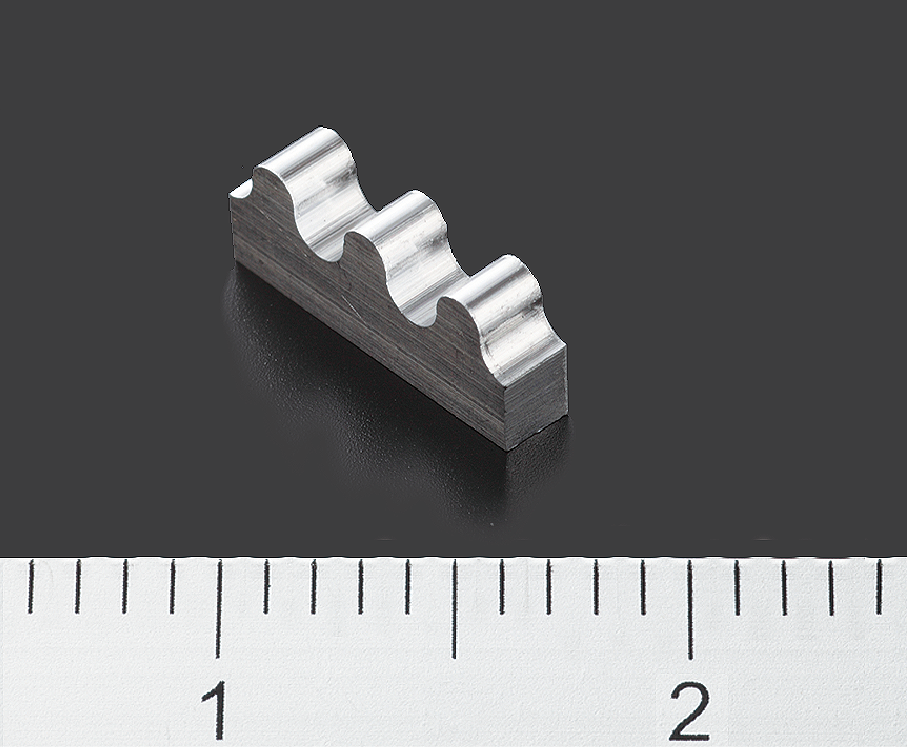
Mirror Surface Metal Base
Material & Thickness
Aluminum (2mm)
Typical Manufacturing Limitations
With conventional stamping methods, the machined cross section becomes rough. Cutting is required to achieve a high-precision surface roughness, resulting in high costs due to single-piece manufacturing.
JKB's Advanced Technology
JKB succeeded in stamping the cross-section with a surface roughness as high as that of cutting. By changing the production method from cutting to stamping, costs were reduced.
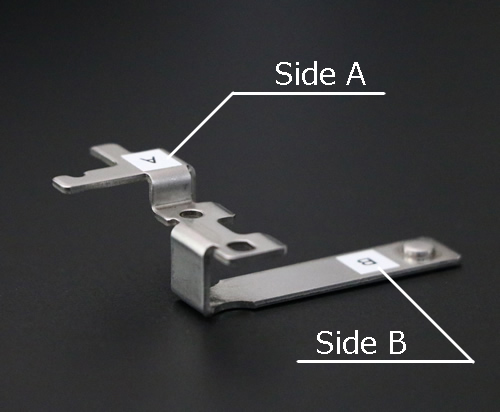
Mechanism Element
Material & Thickness
Stainless Steel (0.8mm)
Typical Manufacturing Limitations
It is necessary to make Side B so that the parallelism between Side A and Side B is 0.1mm or less, but the part that connects Side A and Side B must be bent four times, making it impossible to ensure parallelism accuracy.
JKB's Advanced Technology
JKB utilizes progressive stamping with a single bending accuracy of 0.02mm. As a result, we succeeded in achieving a high accuracy of parallelism of 0.1mm or less between Side A and Side B.
